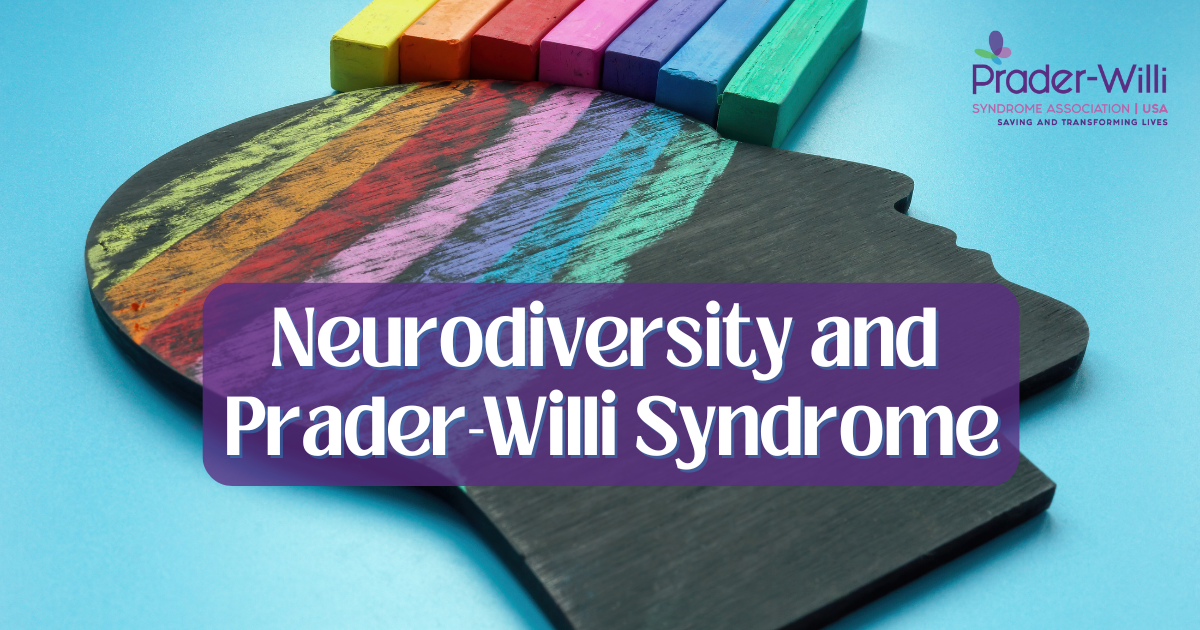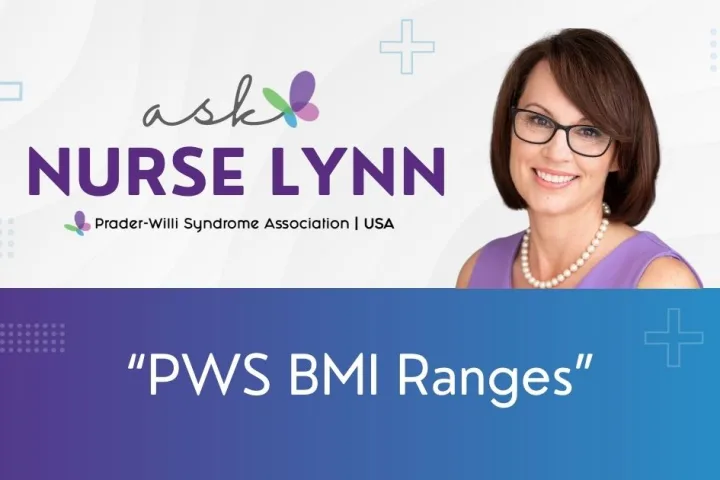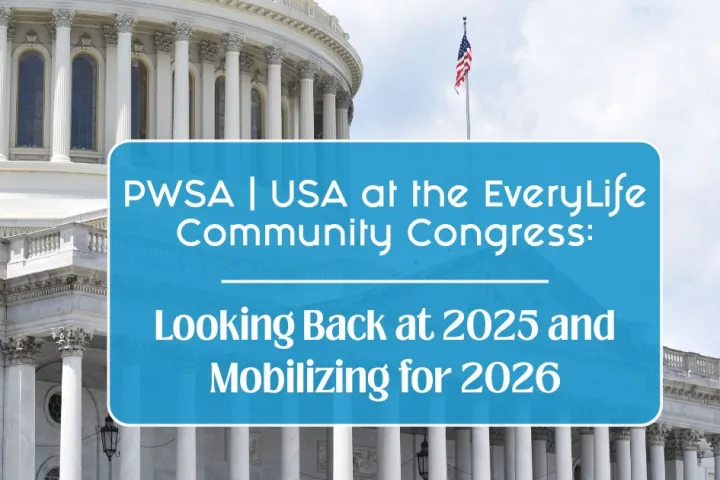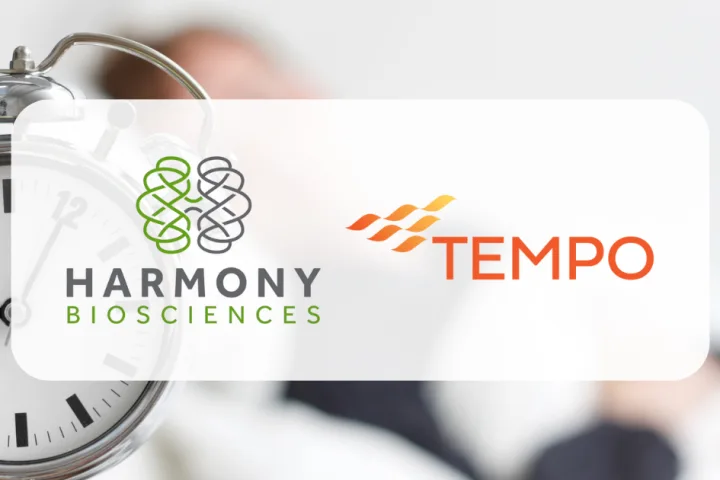Neurodiversity, a term coined by Australian sociologist Judy Singer in the mid-1990s, is a social justice movement that seeks to bring awareness, equality, and inclusion to people of various neurological abilities. According to Harvard Medical School, “The word neurodiversity refers to the diversity of all people, but it is often used in the context of autism spectrum disorder (ASD), as well as other neurological or developmental conditions such as ADHD or learning disabilities.” What is neurodiversity? – Harvard Health
Neurodiversity in Our Community
PWS carries with it a variety of challenges, physical, mental, and cognitive. Individuals with PWS typically have learning issues like poor short-term memory and difficulties with abstract thinking and problem-solving. They also experience higher rates of depression, anxiety, and psychosis than the typical population. Our loved ones may even receive a diagnosis of other, more commonly known, neurological conditions like autism.
The point is not to prove that people with PWS fall into the “neurological minorities” category for the sake of highlighting differences but as a statement and reminder that they also deserve to be named in the fight for the inclusion of those seen as neurodivergent. As psychiatrist Lawrence Fung, MD, Ph.D., states, “Neurodivergent individuals make up the largest minority group in the United States but have yet to receive proper support in most social and professional settings.” (https://autism.org/neurodiversity-education-employment/)
Many parents and caregivers of individuals with PWS have experienced this lack of proper support. Part of the work PWSA does is help families advocate for their loved ones in school, with doctors and specialists, in the workplace, and, ultimately, in the community they live in. When our loved ones are defined simply by the challenges of PWS, it is a detriment to both them and society.
Focusing on the Positives
In her recent Family Support webinar, Patrice Carroll, Director of PWS Services at Latham Centers, began by discussing the many positive traits individuals with PWS often possess. Patrice, who has worked with individuals with PWS for over twenty years, notes that people with PWS are often:
Social
Rule Followers
People Pleasers
Funny
Compassionate
Loving
In the Moment
Trusting
She encouraged us to focus on these traits rather than the disruptive behaviors our loved ones exhibit when they are merely reacting to their environment. Focusing on their positive characteristics can help mitigate and lessen unwanted behaviors. This valuable insight may be applied to most people, neurodivergent or not.
How Neurodiversity Works
Advocates argue for a strengths-based model of Neurodiversity, in which society (workplace, school, peers, etc.) looks at an individual’s strengths, growth, satisfaction, and positive attributes rather than defining them by their disabilities and challenges. We should recognize that, as humans, we all have positive and challenging attributes. Most people do not want to be defined by their challenges, so why would we assume that our loved ones do as well? It is essential to know the challenges our loved ones may exhibit, possible disruptive behaviors, and how to approach them. But it is also critical and just to honor and recognize their many positive qualities.
Neurodiversity Celebration Week “challenges stereotypes and misconceptions about neurological differences. It aims to transform how neurodivergent individuals are perceived and supported by providing schools, universities, and organisations with the opportunity to recognise the many talents and advantages of being neurodivergent, while creating more inclusive and equitable cultures that celebrate differences and empower every individual.” https://www.neurodiversityweek.com
The hope is that employers, schools, and society at large can focus on people’s strengths, learn more about the nuances of individuals, and make appropriate adjustments so our loved ones may also be active and valued participants. Recognizing, celebrating, and including neurodiversity in how society functions is a decisive step toward creating and nurturing a more meaningful, safe, and inclusive environment.
In Celebration of Neurodiversity and PWS
Patrice Carroll captures the essence of Neurodiversity Celebration Week and PWS by saying, “We make assumptions that people with PWS are somehow less valuable to society because of their challenges. We often neglect to see the vibrance and beauty in their nature. People with PWS live in the moment, a skill that many neurotypical people strive to do for their entire lives and may not succeed. The openness, trust, and light that people with PWS give to the world make them invaluable guides to what society should value most: sincerity and hope.”
Resource Links
PWSA | USA Family Support Webinar with Patrice Carroll
Learn more about Neurodiversity, how words matter, and fostering neurodiversity in the workplace HERE
Share this!





 Perry A. Zirkel has written more than 1,500 publications on various aspects of school law, with an emphasis on legal issues in special education. He writes a regular column for NAESP’s Principal magazine and NASP’s Communiqué newsletter, and he did so previously for Phi Delta Kappan and Teaching Exceptional Children.
Perry A. Zirkel has written more than 1,500 publications on various aspects of school law, with an emphasis on legal issues in special education. He writes a regular column for NAESP’s Principal magazine and NASP’s Communiqué newsletter, and he did so previously for Phi Delta Kappan and Teaching Exceptional Children. Jennifer Bolander has been serving as a Special Education Specialist for PWSA (USA) since October of 2015. She is a graduate of John Carroll University and lives in Ohio with her husband Brad and daughters Kate (17), and Sophia (13) who was born with PWS.
Jennifer Bolander has been serving as a Special Education Specialist for PWSA (USA) since October of 2015. She is a graduate of John Carroll University and lives in Ohio with her husband Brad and daughters Kate (17), and Sophia (13) who was born with PWS. Dr. Amy McTighe is the PWS Program Manager and Inpatient Teacher at the Center for Prader-Willi Syndrome at the Children’s Institute of Pittsburgh. She graduated from Duquesne University receiving her Bachelor’s and Master’s degree in Education with a focus on elementary education, special education, and language arts.
Dr. Amy McTighe is the PWS Program Manager and Inpatient Teacher at the Center for Prader-Willi Syndrome at the Children’s Institute of Pittsburgh. She graduated from Duquesne University receiving her Bachelor’s and Master’s degree in Education with a focus on elementary education, special education, and language arts. Evan has worked with the Prader-Willi Syndrome Association (USA) since 2007 primarily as a Crisis Intervention and Family Support Counselor. Evans works with parents and schools to foster strong collaborative relationships and appropriate educational environments for students with PWS.
Evan has worked with the Prader-Willi Syndrome Association (USA) since 2007 primarily as a Crisis Intervention and Family Support Counselor. Evans works with parents and schools to foster strong collaborative relationships and appropriate educational environments for students with PWS. Staci Zimmerman works for Prader-Willi Syndrome Association of Colorado as an Individualized Education Program (IEP) consultant. Staci collaborates with the PWS multi-disciplinary clinic at the Children’s Hospital in Denver supporting families and school districts around the United States with their child’s Individual Educational Plan.
Staci Zimmerman works for Prader-Willi Syndrome Association of Colorado as an Individualized Education Program (IEP) consultant. Staci collaborates with the PWS multi-disciplinary clinic at the Children’s Hospital in Denver supporting families and school districts around the United States with their child’s Individual Educational Plan. Founded in 2001, SDLC is a non-profit legal services organization dedicated to protecting and advancing the legal rights of people with disabilities throughout the South. It partners with the Southern Poverty Law Center, Protection and Advocacy (P&A) programs, Legal Services Corporations (LSC) and disability organizations on major, systemic disability rights issues involving the Individuals with Disabilities Education Act (IDEA), Americans with Disabilities Act (ADA), and the federal Medicaid Act. Recently in November 2014, Jim retired.
Founded in 2001, SDLC is a non-profit legal services organization dedicated to protecting and advancing the legal rights of people with disabilities throughout the South. It partners with the Southern Poverty Law Center, Protection and Advocacy (P&A) programs, Legal Services Corporations (LSC) and disability organizations on major, systemic disability rights issues involving the Individuals with Disabilities Education Act (IDEA), Americans with Disabilities Act (ADA), and the federal Medicaid Act. Recently in November 2014, Jim retired.